DevOps professionals play a critical role in connecting software development and IT operations. This role necessitates a deep understanding of the cloud platforms supporting continuous integration, deployment, and automation. Mastering cloud platforms is now crucial to every DevOps engineer because many companies have moved or are moving their systems to the cloud.
One very effective way to validate your ability in cloud technologies is to acquire recognized cloud certifications. In this blog, I will discuss some of the most popular cloud certifications that will help to boost your DevOps career.
Importance of Cloud Certifications in DevOps
Before diving into specific certifications, it's essential to understand why cloud certifications are so valuable for DevOps professionals:
- Skills validation: Certifications validate your expertise in specific cloud platforms.
- Professional growth: In most cases, certified individuals are the first choice when it comes to specialized roles, promotions, and salary increases
- Updated knowledge: Certifications help you stay up-to-date with the latest developments in cloud technologies and DevOps practices. That’s why most need to be renewed after a specified period.
- A broader scope of opportunities: As more companies shift their infrastructure to the cloud, professionals with certifications have been getting more lucrative job opportunities.
- Networking: They allow you to be part of a certified community, which can offer networking opportunities and further enhance your credibility in the industry.
5 Popular Cloud Certifications for DevOps
Below are the 5 most popular DevOps cloud certifications:
1. AWS Certified DevOps Engineer – Professional
AWS Certified DevOps Engineer—Professional is a certification tailored for professionals with a strong background in DevOps and knowledge of AWS services. It validates one’s expertise in provisioning, operating, and managing distributed application systems on the AWS platform.
Key Concepts Covered
The certification exam covers the following key areas:
- Continuous Delivery and Automation: This tests your understanding of how to implement and manage continuous delivery systems and methodologies on AWS.
- Monitoring and Logging: This covers the different methods of collecting and tracking logs using specific AWS services, such as CloudWatch and CloudTrail.
- Security Controls: This includes implementing scalable security best practices, such as identity and access management (IAM) and encryption techniques.
- Infrastructure as Code: You will learn how to develop and manage infrastructures by employing services such as AWS Cloud Formation and AWS Operations Work Suites.
Benefits of AWS Certified DevOps Engineer – Professional Certification
This certification is well-recognized and belongs to the AWS’s advanced certifications category. It shows that you have adequate experience in processing different complex DevOps operations in an AWS setting. This increases your value to any organization implementing AWS for its operations.
2. Microsoft Certified: Azure DevOps Engineer Expert
The Microsoft Certified: Azure DevOps Engineer Expert certification is a credential designed for professionals who are managing people, processes, tools, and technologies on Microsoft Azure. This certification is aimed at those who seek to prove their ability to work in the sphere of DevOps and their knowledge of the Azure environment.
Key Concepts Covered
The certification exam covers the following key areas:
- Processes and Communications: This tests your ability to set up systems and processes that enable seamless communication between development, operations, and other stakeholders.
- Source control strategy: This tests your ability to use a version control system to manage source code.
- Build and release pipelines: This covers designing and configuring release pipelines to automate the deployment of applications to various environments (development, testing, production).
- Security and compliance: This covers the incorporation of security practices into every stage of the DevOps process.
- Instrumentation strategy: This covers setting up systems to monitor the performance and health of applications and infrastructure.
Benefits of Microsoft Certified: Azure DevOps Engineer Expert Certification
This certification is a great addition for any DevOps professional who works with Azure. It validates your expertise in incorporating and overseeing DevOps patterns on Microsoft’s cloud platform, making you a key player in any organization using Azure.
To learn more about Azure DevOps, check out this blog: What Is Azure DevOps? Everything You Need to Know.
3. Google Cloud Professional DevOps Engineer
The Google Cloud Platform Professional DevOps Engineer certification is a credential that validates an individual's ability to implement and manage systems on the Google Cloud Platform (GCP). It focuses on operational efficiency, service reliability, and continuous delivery.
Key Concepts Covered
The certification exam covers the following key areas:
- Site Reliability Engineering (SRE): This domain is centered on SRE practices, which are conceptually related to the DevOps processes.
- CI/CD Pipelines: This tests your ability to implement and sustain CI/CD pipelines using Google Cloud products.
- Monitoring and Incident Management: This covers how Google Cloud’s Monitoring and Logging, like Stackdriver, handles incidents or guarantees the system's steadiness.
- Security and Compliance: This tests your knowledge of GCP security measures and compliance with GCP solutions.
Benefits of Google Cloud Professional DevOps Engineer
Gaining a Google Cloud Professional DevOps Engineer certification opens the door to many job opportunities. This certification validates your capacity to take up a leadership role in organizations that use the GCP platform.
4. Certified Kubernetes Administrator (CKA)
Kubernetes simplifies application deployment, scaling, and monitoring, making it an essential tool for modern DevOps practices. If you're a DevOps engineer looking to validate your Kubernetes skills, attaining the Certified Kubernetes Administrator (CKA) certification is the best way to do it.
Key Concepts Covered
The certification exam covers the following key areas:
- Storage: This tests your understanding of persistent volumes and creating storage classes to dynamically provision storage based on defined parameters.
- Troubleshooting: This tests your ability to diagnose and resolve Kubernetes cluster issues using in-built debugging tools and techniques.
- Workloads & Scheduling: This covers creating and managing different types of workloads (Pods, Deployments) and understanding Kubernetes scheduling mechanisms.
- Cluster Architecture, Installation, and Configuration: This covers Kubernetes architecture and how to install and configure Kubernetes clusters.
- Services & Networking: This tests your ability to create and manage different types of services (ClusterIP, NodePort, Ingress) and configure network policies for security.
Check out this blog: Top 5 Tips to Prepare for the CKA Exam in 2023: A Comprehensive Guide.
Benefits of Certified Kubernetes Administrator (CKA)
Holding a CKA certification accelerates the opportunity for a professional career in the growing cloud-native and other DevOps fields. Holders of the CKA certificates can easily earn higher salaries because they are specialized Kubernetes administrators. Overall, CKA is helpful for individuals and businesses that are navigating the field of cloud-native technologies.
ENROLL in our CKA certification course.
5. Docker Certified Associate (DCA)
The Docker Certified Associate (DCA) accreditation is a professional endorsement for IT experts who work with container technologies. It affirms your know-how in creating, deploying, and managing Docker containers.
Key Concepts Covered
- Orchestration: This covers using Docker Swarm to automate the management of Docker containers.
- Image Creation, Management, and Registry: This covers creating docker images using Dockerfiles and pushing/pulling docker images from DockerHub or other registries.
- Installation and Configuration: This tests your ability to install Docker on different operating systems and set up Docker production environments.
- Networking: This tests your ability to set up network options such as port mapping and network mode for containers.
- Security: This covers Docker’s security model and best practices for securing containerized applications.
- Storage and Volumes: This tests your understanding of how to manage data in Docker containers using volumes and bind mounts.
Benefits of Docker Certified Associate (DCA) Certification
The DCA certification demonstrates a strong understanding of Docker and containerization, validating your skills to employers, peers, and clients. The knowledge gained through DCA certification helps you work more efficiently with Docker, leading to improved productivity. Additionally, you will be better equipped to automate workflows, optimize application deployment, and reduce downtime through effective container management.
How to Choose the Right Certification for Your DevOps Career
Here are some factors to consider when deciding which certification is best for you:
Career Goals
Think about the jobs and positions you would like to hold in the future. If, for instance, you want to work on AWS, Azure, or Google Cloud, it will be wise to get certifications from those cloud platforms.
Current Skill Level
If you are new to cloud technologies or DevOps, start with entry-level certifications like the AWS Certified Cloud Practitioner or Azure Fundamentals. However, if you have prior experience, you can go with the AWS/Microsoft/Google DevOps certifications mentioned in this article.
Cost and Time Investment
Certifications require both money and time investment. You need to determine the cost of the certification exam and the preparation course if you plan to enroll in one. Also, you should consider how much time it will take to prepare sufficiently. Some certifications are complex and require a lot of time, study, and practice.
Personal Interest
Your personal interest and passion should also guide your decision. Select certifications in the areas of DevOps and cloud computing that appeal to you. This will increase your interest in the learning process and guarantee continued effectiveness and success in your professional activity.
Conclusion
Cloud certifications act as an effective means to build the credentials for a DevOps professional, an opportunity to get more job offers, and a chance to get a better-paid position. Regardless of the platform you decide to specialize in – AWS, Azure, Google Cloud, or others, getting the necessary certifications opens the doors to the rapidly developing DevOps field.
At Kodekloud, we have top-rated Cloud Courses that will:
- Keep your team updated on the latest cloud technologies and methodologies.
- Help prepare your engineers for industry-recognized certifications, boosting your team's credibility and cloud expertise.


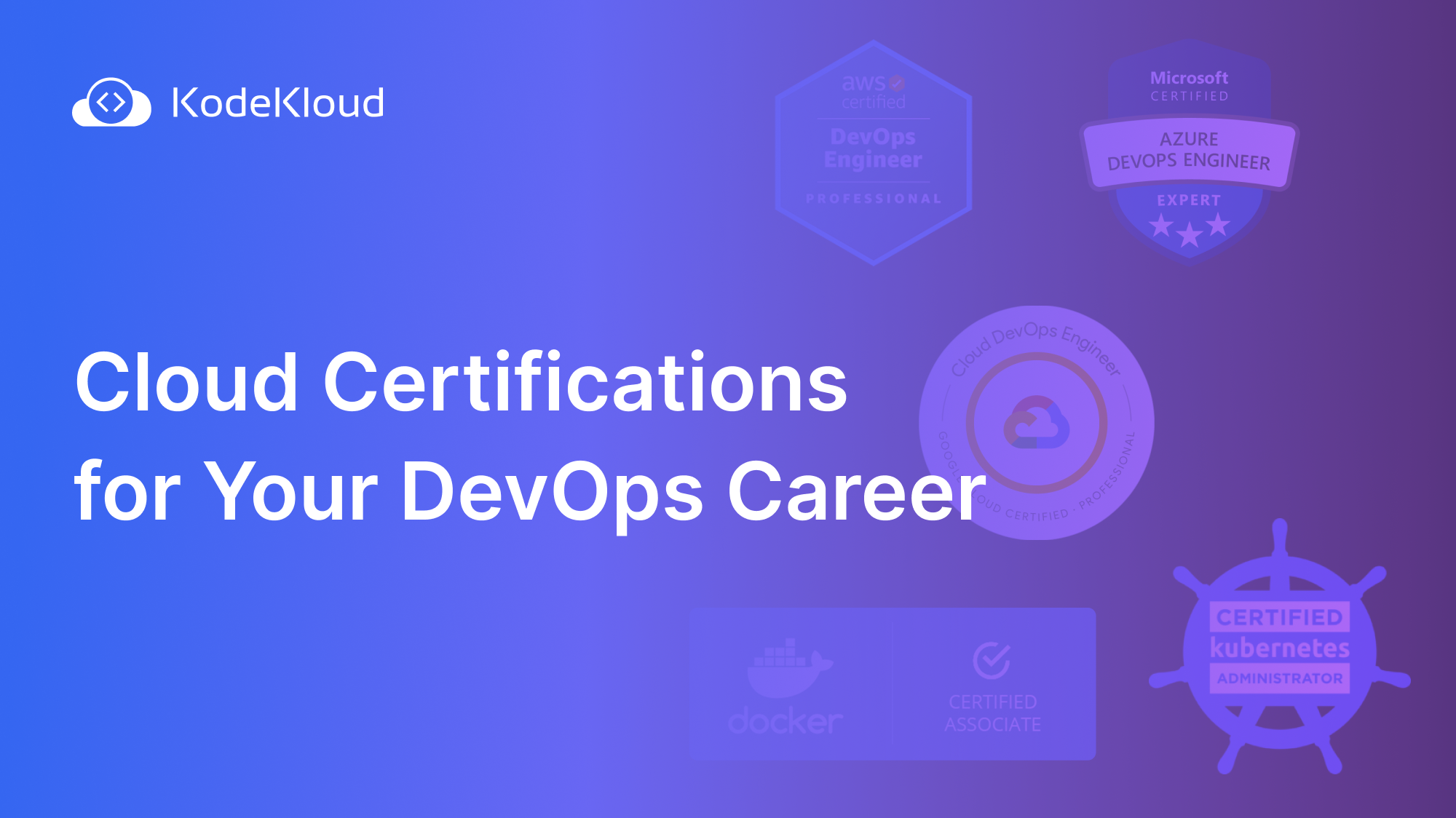
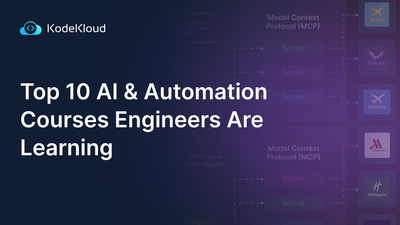

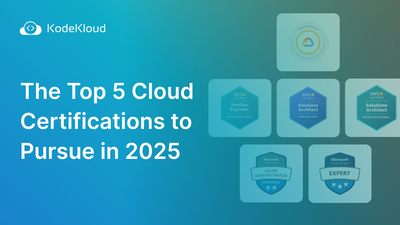
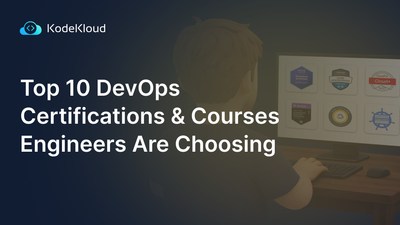

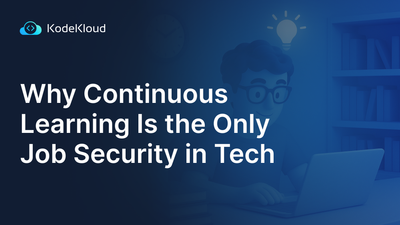

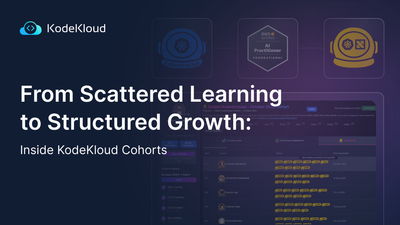
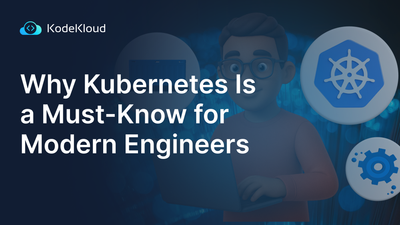

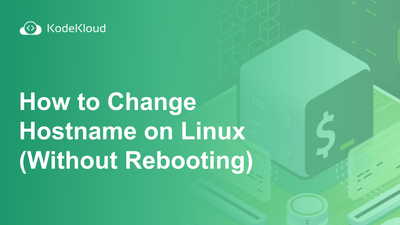

Discussion